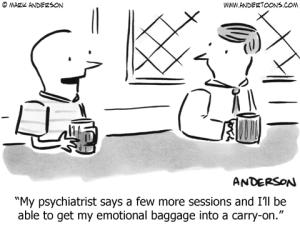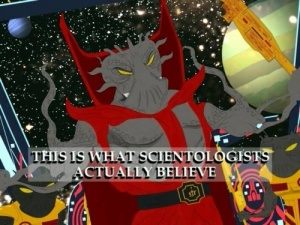
This is an actual question an auditor asks you during the introductory (“communications”) course that is really an early indoctrination procedure.
This is my second post about Scientology. It will be in two parts.
My first post about Scientology was about my own experience (thankfully, short lived) in the cult, but this one will focus less on my own personal experience and more on how Scientology (and the related Dianetics) “auditing” works and why it isn’t at all like (and is far inferior to) traditional psychotherapy (that is, when you have a good, empathetic therapist).
But before I get into the differences, I feel it’s necessary to give you some background about Dianetics and Scientology auditing and the religion that arose from it.
Mainstream mental health: an imperfect science.

Psychotherapy isn’t perfect, and of course, there are many bad therapists. Even when you have a therapist who you are comfortable with and who knows what they’re doing, it can take years to be “cured.” It isn’t an exact science, or really, much of a science at all (it’s more of an art form) so there aren’t any easy answers or sure-fire “formulas.” Human beings are complicated, and a modality that may work well on one person may actually do nothing for another, or even make them worse. And of course, there are many terrible therapists, who are either completely incompetent, are only in it for the money, lack enough empathy to be effective, are unconsciously attempting to work out their own issues (which is what attracted them to the profession in the first place), and even (if they are sociopathic or narcissistic, and many are) exploit or emotionally abuse their clients.
People can also become “addicted” to their therapists. They can become overly dependent on them and never leave therapy because they feel like they can’t cope on their own. And it’s true, some therapists do become unhealthily attached to their clients, and discourage them from ever leaving. A good therapist who doesn’t have unresolved attachment issues will discourage a client from becoming overly dependent on them (while still projecting warmth and empathy), with the end goal being for the client to be able to leave and function better and feel happier, using new sets of emotional tools to do so.
But psychotherapists (both psychiatrists, who are medical doctors who can prescribe drugs, and psychologists and clinical social workers, who cannot) are bound by the law. In a best case scenario, they must abide by the law and a certain code of ethics, or be barred from practicing their professions or even face civil or criminal charges.
All these disadvantages aside, traditional psychotherapy is a positive and life-changing experience for most people who undergo it and stick with it, and it has existed for over a century. There are many different modalities suited for different psychological disorders or problems. There are both short term and long-term methods. Some, like CBT or DBT, aren’t cures but are really training methods that teach a person mindfulness skills so they can function better and are less symptomatic. Others, like Freudian or Jungian psychoanalysis, schema therapy, attachment therapy, psychodrama, EFT, hypnotherapy, and other “talk therapy” methods are long-term modalities that actually attempt to get to the root of the client’s problems or release trauma. Many therapists mix several different modalities, and some include mindfulness tools like meditation, visualization, and relaxation techniques into their sessions. Talk therapy can take many months or even years to have results. In a best case scenario, the client will be cured of whatever is ailing them. Even if they aren’t cured, a lot of the charge that was feeding their disorder is removed. Some disorders, especially those that have a physical component or are due to faulty neurological “wiring” respond better to drugs than to talk therapy, and continued management by a psychiatrist may be necessary, even though improvement in symptoms is almost immediate.
Scientology’s beginnings.

The book that started it all.
Scientology has always been very hostile to both psychiatry and psychology. L. Ron Hubbard, a second rate science fiction author, had always been fascinated with the human mind and how it worked. He published his bestselling book about his discoveries, “Dianetics: The Modern Science of Mental Health” in 1950. Dianetics is a bastardization of traditional psychoanalysis, but really isn’t much like it at all. Hubbard was a sociopathic narcissist who had no degree in psychology and in fact lied about many of his accomplishments.
Dianetics uses elements of Freudian psychoanalysis, but is based on the belief that almost all people have “engrams” (unless they are “natural clears,” which are very rare). Engrams are cellular imprints of moments of trauma that always contain some sort of physical pain and the “unconsciousness” that accompanies a painful or traumatic event. The part of the mind that contains the “engrams” is called the reactive mind, and the goal of Dianetics “auditing” is to remove all the engrams through “reliving” the memories associated with them, so the person eventually attains a state called “Clear,” which means they have no reactive mind anymore and can act in rational and healthy ways not based on unconscious painful memories or trauma.

A Scientology anti-psychiatry demonstration.
In the early years of Dianetics, Hubbard attempted to get it recognized as a valid form of psychotherapy, but his book and methods were rejected by the mental health community. Hubbard, being a malignant narcissist who was devastated by this massive narcissistic injury, turned against the entire mental health field. He vilified it and preached to his followers that psychiatry and psychology were the worst evils to befall mankind and that Dianetics was the only valid way to become a happy and functioning person.
A new religion is born.

Hubbard began to market his book through the same pulp science fiction magazines that published his stories, and his Dianetics book proved popular. Many people claimed to be helped through Dianetics auditing, but this wasn’t enough for Hubbard. He was quoted as saying, “the quickest way to become rich is to start your own religion,” and so he did. Not only could he become the messiah of his own church based on his “miracle cure,” he also no longer had to pay taxes. He trained many new auditors and started the Church of Scientology in December, 1953. He added the levels of O.T. (Operating Thetan) states that go beyond the state of Clear. An OT supposedly had complete control over matter, energy, space, and time, and at the highest level, could perform Herculean actions without even needing a body to do it.
To his religion Hubbard added a “space opera” cosmology, which sounds suspiciously like a plot in one of his stories. The level of OT III is the level at which the “top secret” cosmology is finally revealed (of course, now due to the Internet, anyone can find out about it for free). Supposedly, an evil galactic ruler called Xenu, who lived 75 million years ago, thought his planets were overpopulated and had most of the population frozen and dumped into volcanoes in Hawaii (which didn’t exist 75 million years ago), and programmed their spirits (thetans) with the “R6” implant, which is the reason why traditional religion and mental illness (and all other evils of mankind) came into being. These disembodied spirits were then released and attached themselves to living people as “body thetans” (BT’s). BT’s are analogous to possession by minor demons. A person at the OT levels spends much time “auditing out” the BT’s to achieve more perfect spiritual enlightenment. Scientology’s insane doctrine was illustrated in a famous episode of South Park in 2005. It’s so unbelievable that the show had to show disclaimers at the bottom of the screen that said, “This is what Scientologists actually believe.”

From “Trapped in the Closet,” South Park episode.
Hubbard believed if this “top secret” material were revealed to someone at a lower level of “processing,” that they would die of pneumonia or go insane. His real fear was probably that people might laugh his church out of existence. Of course, most Scientologists (at least before the Internet) don’t even know about this secret doctrine because so few of them have achieved the state of OT III. Many (who haven’t been completely brainwashed into believing anything they are told) leave when they find out. Others are offended that figures like Jesus or the Buddha are considered “implants” who never even existed, especially since when they first joined Scientology, they were promised that their own religion was not incompatible with Scientology. At OT III, they find out they must renounce their former religious beliefs, if they still had any. It’s the ultimate bait and switch, something Scientology is well known for.
“You don’t get rich writing science fiction. If you want to get rich, you start a religion.” — L. Ron Hubbard
Scientology also co-opted the Christian cross (although the eight pointed version Scientology uses is actually based on the Rosicrucian cross) and sometimes requires its clergy (professional auditors and high ranking church officials) to wear clerical collars in public to seem more authentic.
During the late 1950s through the 1970s, when people were becoming interested in alternative therapies and “new age” religions, the Church of Scientology exploded in popularity, until the late 1970s when the IRS and the FBI descended on Hubbard and his church due to tax fraud and other shady and unethical activities conducted at Scientology’s headquarters and at its paramilitary offshoot, The Sea Org. While Scientology remains popular, especially among celebrities and the very wealthy, the costs of Scientology training and Dianetics auditing are far too expensive for the average person to afford, so the only people who can move up the “Bridge” and attain the rarified Clear or O.T. (Operating Thetan) states, are the very wealthy or those unfortunates who “work off” the expense as residents of the Sea Org (and rarely achieve those states anyway).
Dianetics and Scientology auditing vs. traditional psychotherapy.
Moving away from the religious aspects of Scientology and back to its original purpose as a form of “therapy” (and most people who undertake Dianetics or Scientology auditing are only using it as a form of therapy anyway, having no idea of what they’re really getting into), please read Part 2:
Why Scientology auditing is not at all like traditional psychotherapy (part 2).

I remember my dad telling me a couple things about Scientology along the lines of what you said. (He just happened to read an article on it.) This post is very informative!
LikeLiked by 1 person
excellent post. I remember a good friend being sucked into the odd vortex of scientology back in 1969..she ended up giving all her money (and half of her parent’s money) to the “church”..separated herself from family and friends and became what we called a “space cadet”. Poor girl lost what mind she had.
LikeLiked by 1 person
Unfortunately, her experience is more the rule than the exception. They will take everything from you, including your mind.
LikeLike
Lucky, have you thought of starting a blog about Scientology? You have so much material. I was tempted to do it but you know so much more and you have that personal experience.
LikeLiked by 1 person
No, these two posts are all I want to write about it. I was just thinking about it this week, but I definitely don’t want to start a blog about it. It could be dangerous too.
LikeLike
I recall when I lived in the big smoke as a young adult I’d regularly walk past the local office of Scientology in the city – they would have people out on the footpath accosting passers by asking inane questions – the most popular was “do you want to be happy”. They weren’t happy with the answer “I already am” and even less happy when I asked them why they weren’t happy that I was happy and why they would ask me if I wanted to be happy if they weren’t. Very pushy people … The hardest thing to keep in mind is that the people on the street are normal people who have made a mistake, they aren’t to blame as such … but its hard to keep that in perspective in the above context …
LikeLiked by 1 person
Oh, yes. I remember how pushy they were and I also remember having to go out there myself and try to convince people to come up to the mission to take the personality test. The question we had to ask was, “what is ruining you?” I always felt to stupid asking people that, and people would look at you like you were nuts.
LikeLike
L. Ron Hubbard : “You don’t get rich writing science fiction. If you want to get rich, you start a religion.”
My narc father: “And what’s more, churches are tax-exempt!”
(Excellent post, LuckyOtter!)
LikeLiked by 1 person
LOL!
LikeLike
Reblogged this on HarounKolaWP and commented:
Have you been audited before?
LikeLiked by 1 person
Yes, but only co-auditing with another student. I couldn’t afford the “professional auditing” so was taking the course route. Have you? Are you a Scientologist or a former one?
LikeLike